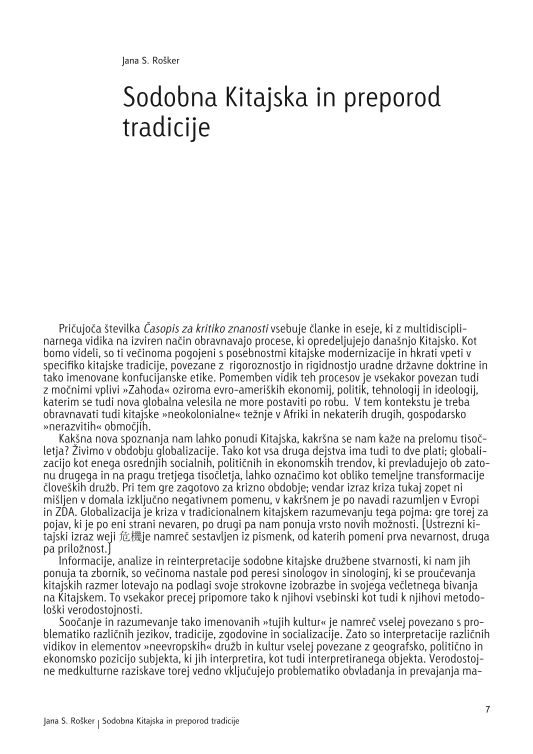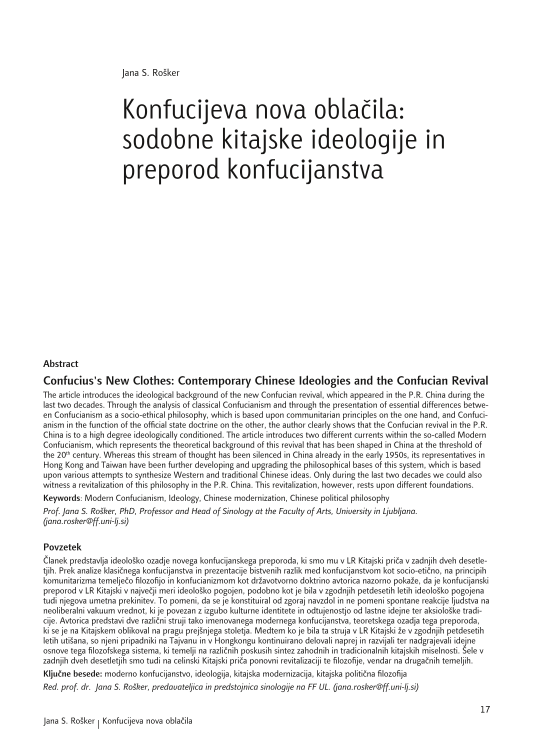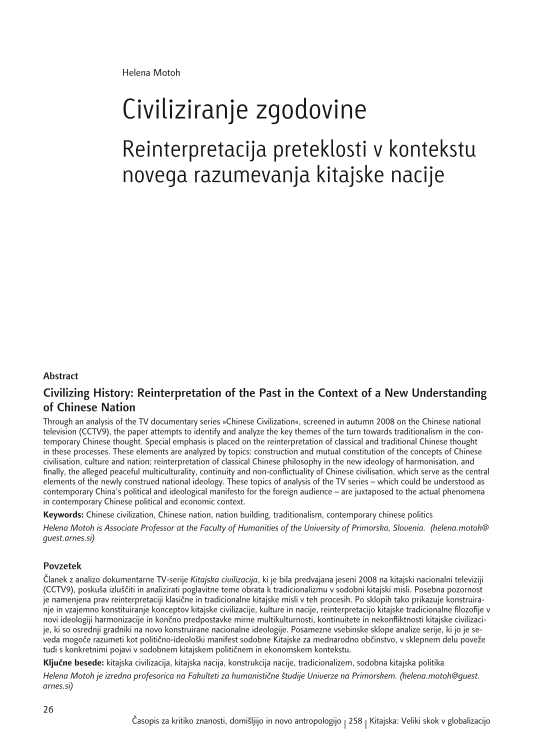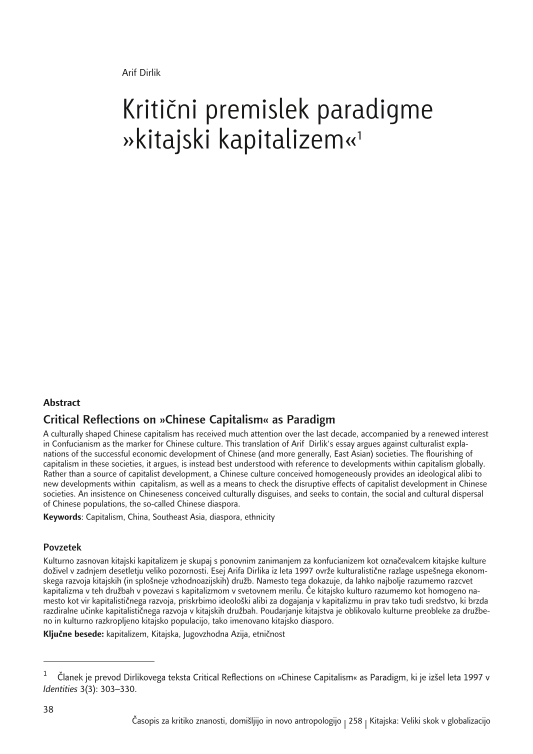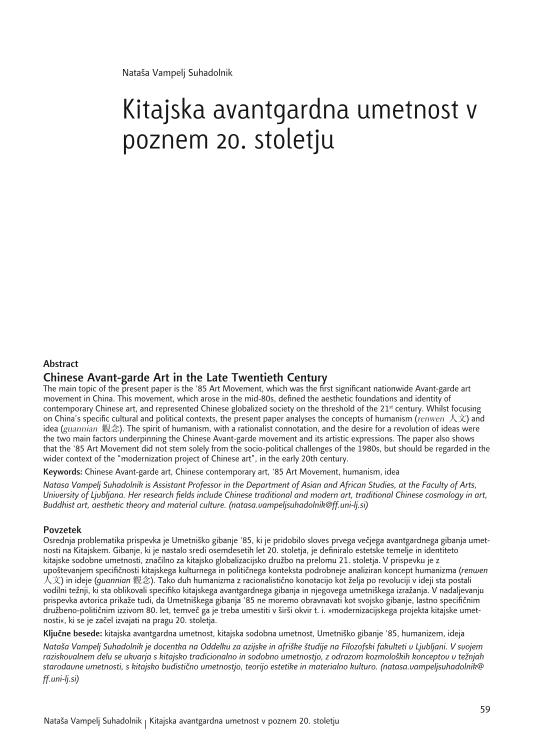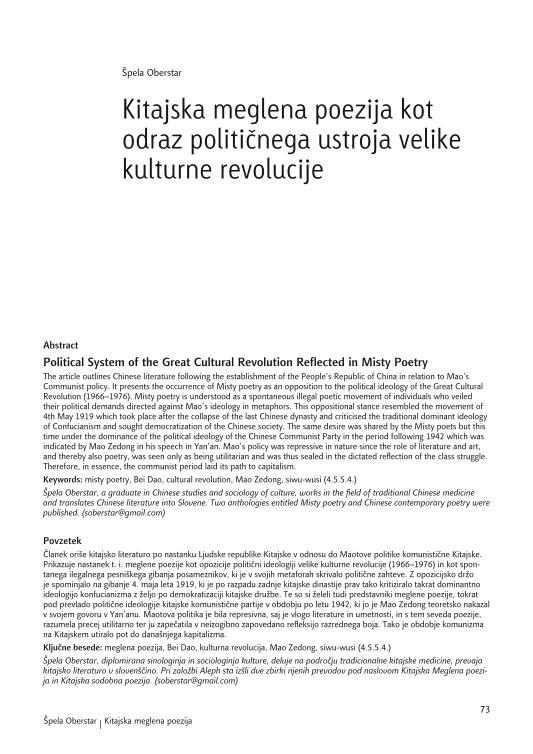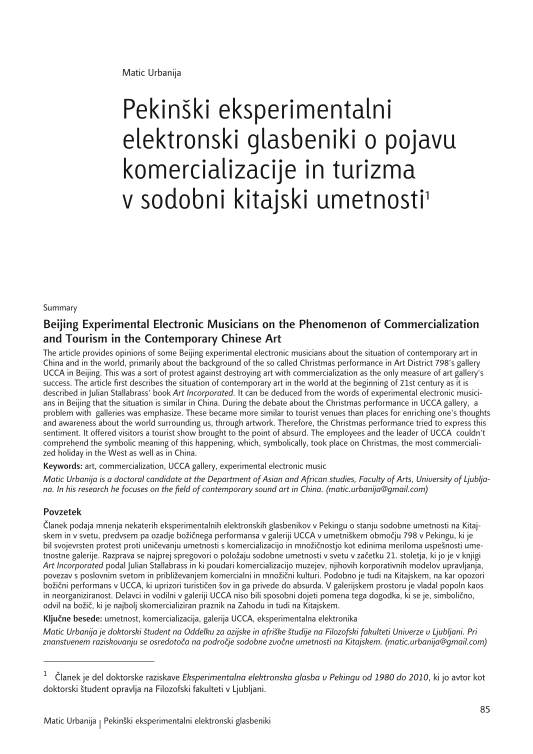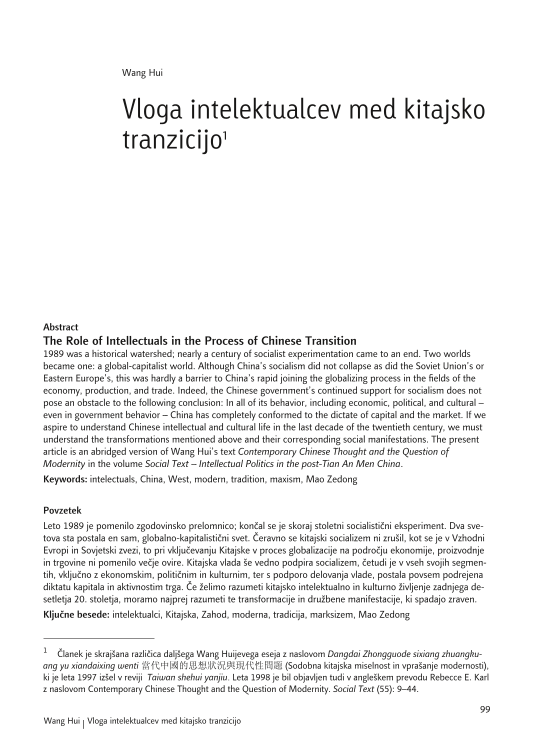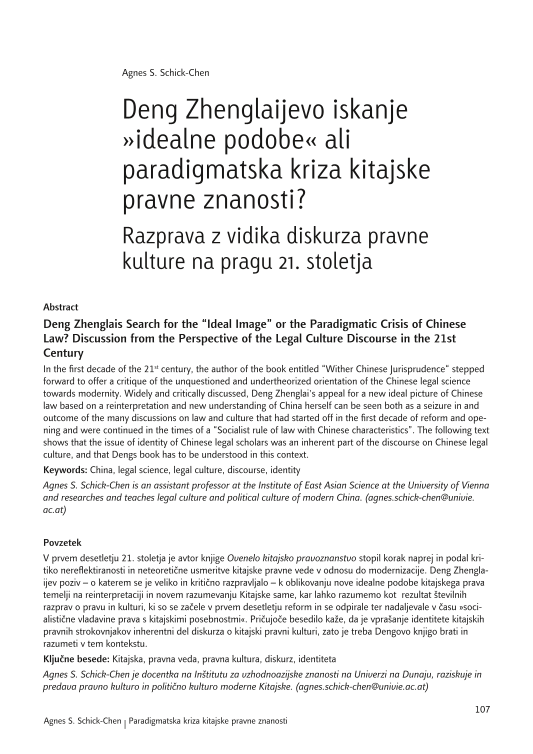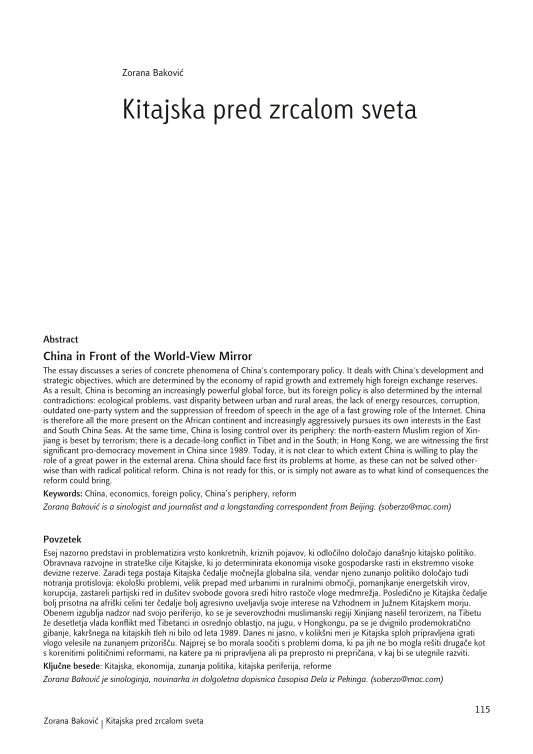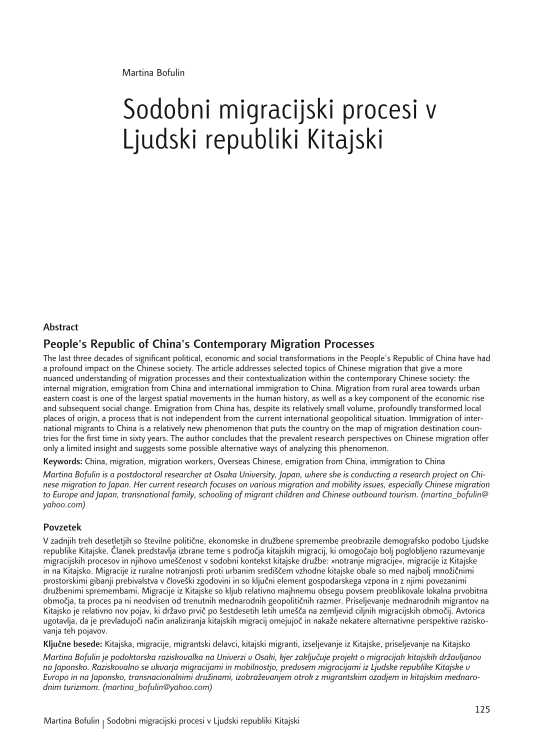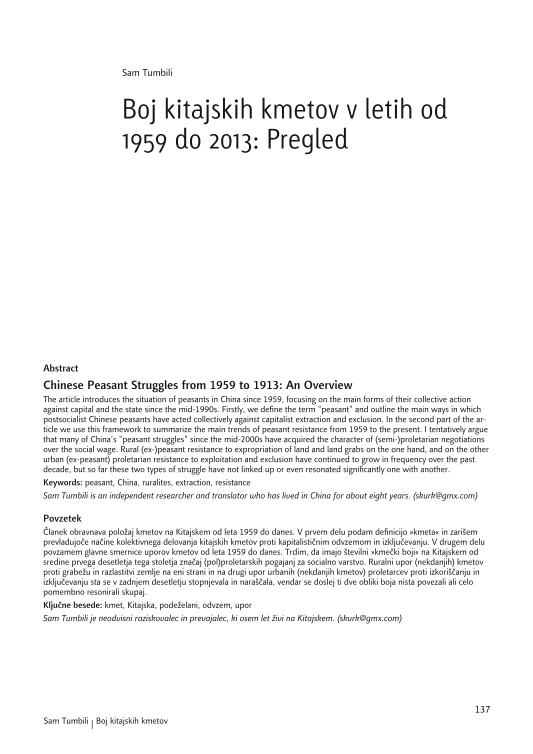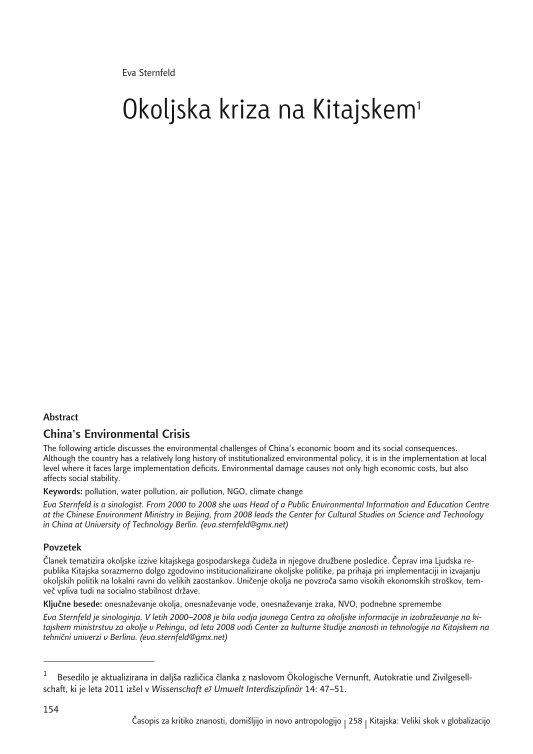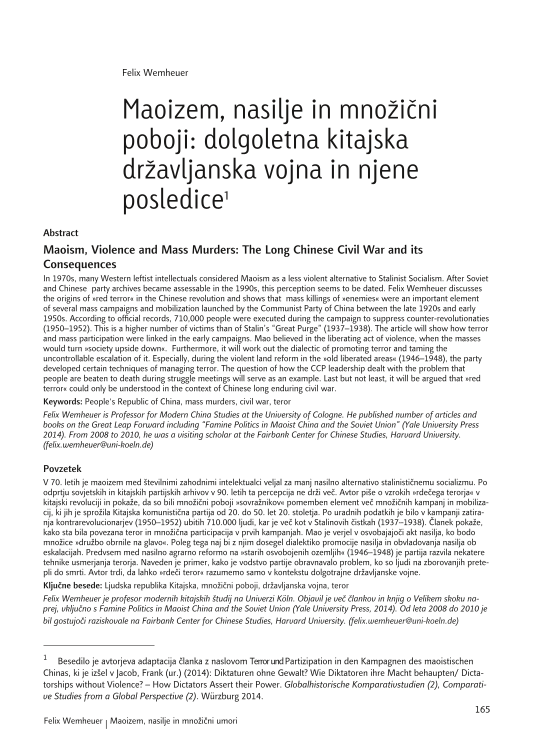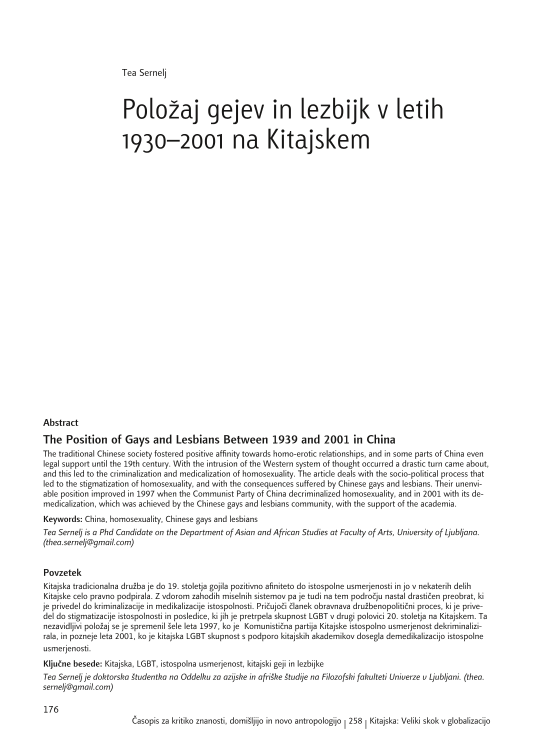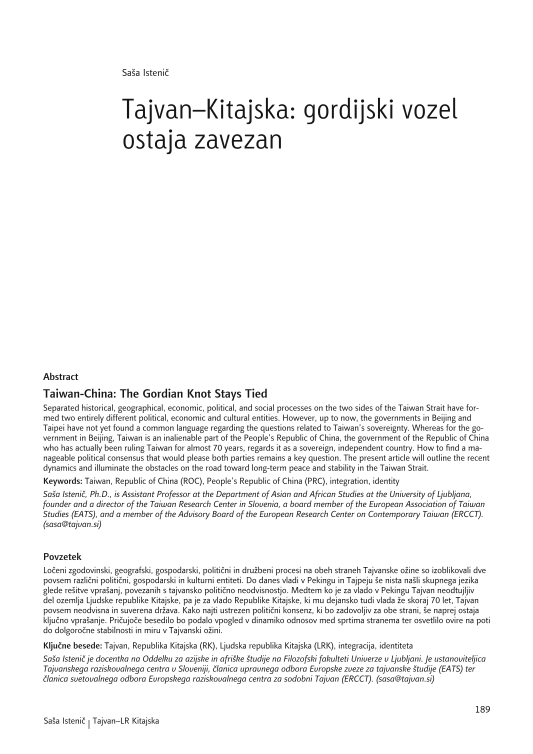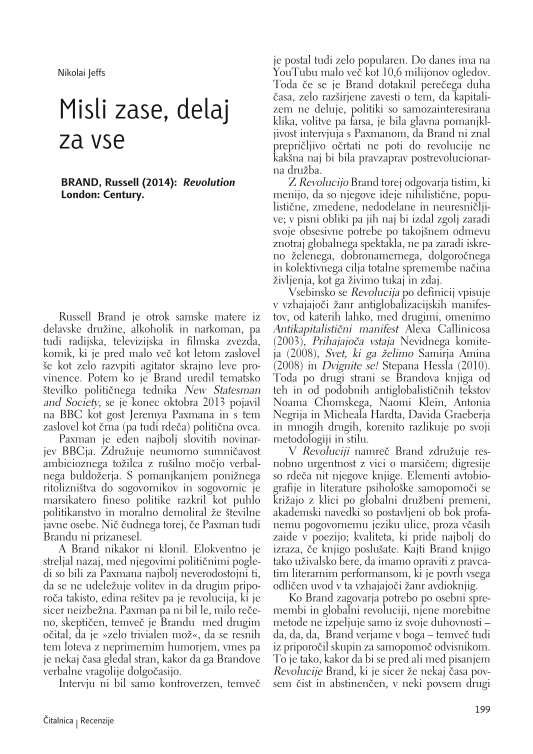Pričujoča številka Časopis za kritiko znanosti vsebuje članke in eseje, ki z multidisciplinarnega vidika na izviren način obravnavajo procese, ki opredeljujejo današnjo Kitajsko. Kot bomo videli, so ti večinoma pogojeni s posebnostmi kitajske modernizacije in hkrati vpeti v specifiko kitajske tradicije, povezane z rigoroznostjo in rigidnostjo uradne državne doktrine in tako imenovane konfucijanske etike. Pomemben vidik teh procesov je vsekakor povezan tudi z močnimi vplivi »Zahoda« oziroma evro-ameriških ekonomij, politik, tehnologij in ideologij, katerim se tudi nova globalna velesila ne more postaviti po robu. V tem kontekstu je treba obravnavati tudi kitajske »neokolonialne« težnje v Afriki in nekaterih drugih, gospodarsko »nerazvitih« območjih.
Kakšna nova spoznanja nam lahko ponudi Kitajska, kakršna se nam kaže na prelomu tisočletja? Živimo v obdobju globalizacije. Tako kot vsa druga dejstva ima tudi to dve plati; globalizacijo kot enega osrednjih socialnih, političnih in ekonomskih trendov, ki prevladujejo ob zatonu drugega in na pragu tretjega tisočletja, lahko označimo kot obliko temeljne transformacije človeških družb. Pri tem gre zagotovo za krizno obdobje; vendar izraz kriza tukaj zopet ni mišljen v domala izključno negativnem pomenu, v kakršnem je po navadi razumljen v Evropi in ZDA. Globalizacija je kriza v tradicionalnem kitajskem razumevanju tega pojma: gre torej za pojav, ki je po eni strani nevaren, po drugi pa nam ponuja vrsto novih možnosti. (Ustrezni kitajski izraz weji 危機je namreč sestavljen iz pismenk, od katerih pomeni prva nevarnost, druga pa priložnost.)
The article introduces the ideological background of the new Confucian revival, which appeared in the P.R. China during the last two decades. Through the analysis of classical Confucianism and through the presentation of essential differences between Confucianism as a socio-ethical philosophy, which is based upon communitarian principles on the one hand, and Confucianism in the function of the official state doctrine on the other, the author clearly shows that the Confucian revival in the P.R. China is to a high degree ideologically conditioned. The article introduces two different currents within the so-called Modern Confucianism, which represents the theoretical background of this revival that has been shaped in China at the threshold of the 20th century. Whereas this stream of thought has been silenced in China already in the early 1950s, its representatives in Hong Kong and Taiwan have been further developing and upgrading the philosophical bases of this system, which is based upon various attempts to synthesize Western and traditional Chinese ideas. Only during the last two decades we could also witness a revitalization of this philosophy in the P.R. China. This revitalization, however, rests upon different foundations.
Civilizing History: Reinterpretation of the Past in the Context of a New Understanding of Chinese Nation
(
Through an analysis of the TV documentary series »Chinese Civilization«, screened in autumn 2008 on the Chinese national television (CCTV9), the paper attempts to identify and analyze the key themes of the turn towards traditionalism in the contemporary Chinese thought. Special emphasis is placed on the reinterpretation of classical and traditional Chinese thought in these processes. These elements are analyzed by topics: construction and mutual constitution of the concepts of Chinese civilisation, culture and nation; reinterpretation of classical Chinese philosophy in the new ideology of harmonisation, and finally, the alleged peaceful multiculturality, continuity and non-conflictuality of Chinese civilisation, which serve as the central elements of the newly construed national ideology. These topics of analysis of the TV series – which could be understood as contemporary China's political and ideological manifesto for the foreign audience – are juxtaposed to the actual phenomena in contemporary Chinese political and economic context.
A culturally shaped Chinese capitalism has received much attention over the last decade, accompanied by a renewed interest in Confucianism as the marker for Chinese culture. This translation of Arif Dirlik's essay argues against culturalist explanations of the successful economic development of Chinese (and more generally, East Asian) societies. The flourishing of capitalism in these societies, it argues, is instead best understood with reference to developments within capitalism globally. Rather than a source of capitalist development, a Chinese culture conceived homogeneously provides an ideological alibi to new developments within capitalism, as well as a means to check the disruptive effects of capitalist development in Chinese societies. An insistence on Chineseness conceived culturally disguises, and seeks to contain, the social and cultural dispersal of Chinese populations, the so-called Chinese diaspora.
The main topic of the present paper is the '85 Art Movement, which was the first significant nationwide Avant-garde art movement in China. This movement, which arose in the mid-80s, defined the aesthetic foundations and identity of contemporary Chinese art, and represented Chinese globalized society on the threshold of the 21st century. Whilst focusing on China’s specific cultural and political contexts, the present paper analyses the concepts of humanism (renwen 人文) and idea (guannian 觀念). The spirit of humanism, with a rationalist connotation, and the desire for a revolution of ideas were the two main factors underpinning the Chinese Avant-garde movement and its artistic expressions. The paper also shows that the '85 Art Movement did not stem solely from the socio-political challenges of the 1980s, but should be regarded in the wider context of the “modernization project of Chinese art”, in the early 20th century.
The article outlines Chinese literature following the establishment of the People’s Republic of China in relation to Mao’s Communist policy. It presents the occurrence of Misty poetry as an opposition to the political ideology of the Great Cultural Revolution (1966–1976). Misty poetry is understood as a spontaneous illegal poetic movement of individuals who veiled their political demands directed against Mao’s ideology in metaphors. This oppositional stance resembled the movement of 4th May 1919 which took place after the collapse of the last Chinese dynasty and criticised the traditional dominant ideology of Confucianism and sought democratization of the Chinese society. The same desire was shared by the Misty poets but this time under the dominance of the political ideology of the Chinese Communist Party in the period following 1942 which was indicated by Mao Zedong in his speech in Yan’an. Mao’s policy was repressive in nature since the role of literature and art, and thereby also poetry, was seen only as being utilitarian and was thus sealed in the dictated reflection of the class struggle. Therefore, in essence, the communist period laid its path to capitalism.
The article provides opinions of some Beijing experimental electronic musicians about the situation of contemporary art in China and in the world, primarily about the background of the so called Christmas performance in Art District 798's gallery UCCA in Beijing. This was a sort of protest against destroying art with commercialization as the only measure of art gallery's success. The article first describes the situation of contemporary art in the world at the beginning of 21st century as it is described in Julian Stallabrass' book Art Incorporated. It can be deduced from the words of experimental electronic musicians in Beijing that the situation is similar in China. During the debate about the Christmas performance in UCCA gallery, a problem with galleries was emphasize. These became more similar to tourist venues than places for enriching one's thoughts and awareness about the world surrounding us, through artwork. Therefore, the Christmas performance tried to express this sentiment. It offered visitors a tourist show brought to the point of absurd. The employees and the leader of UCCA couldn't comprehend the symbolic meaning of this happening, which, symbolically, took place on Christmas, the most commercialized holiday in the West as well as in China.
1989 was a historical watershed; nearly a century of socialist experimentation came to an end. Two worlds became one: a global-capitalist world. Although China’s socialism did not collapse as did the Soviet Union’s or Eastern Europe’s, this was hardly a barrier to China’s rapid joining the globalizing process in the fields of the economy, production, and trade. Indeed, the Chinese government’s continued support for socialism does not pose an obstacle to the following conclusion: In all of its behavior, including economic, political, and cultural – even in government behavior – China has completely conformed to the dictate of capital and the market. If we aspire to understand Chinese intellectual and cultural life in the last decade of the twentieth century, we must understand the transformations mentioned above and their corresponding social manifestations. The present article is an abridged version of Wang Hui’s text Contemporary Chinese Thought and the Question of Modernity in the volume Social Text – Intellectual Politics in the post-Tian An Men China.
In the first decade of the 21st century, the author of the book entitled “Wither Chinese Jurisprudence“ stepped forward to offer a critique of the unquestioned and undertheorized orientation of the Chinese legal science towards modernity. Widely and critically discussed, Deng Zhenglai's appeal for a new ideal picture of Chinese law based on a reinterpretation and new understanding of China herself can be seen both as a seizure in and outcome of the many discussions on law and culture that had started off in the first decade of reform and opening and were continued in the times of a “Socialist rule of law with Chinese characteristics”. The following text shows that the issue of identity of Chinese legal scholars was an inherent part of the discourse on Chinese legal culture, and that Dengs book has to be understood in this context.
The essay discusses a series of concrete phenomena of China's contemporary policy. It deals with China's development and strategic objectives, which are determined by the economy of rapid growth and extremely high foreign exchange reserves. As a result, China is becoming an increasingly powerful global force, but its foreign policy is also determined by the internal contradictions: ecological problems, vast disparity between urban and rural areas, the lack of energy resources, corruption, outdated one-party system and the suppression of freedom of speech in the age of a fast growing role of the Internet. China is therefore all the more present on the African continent and increasingly aggressively pursues its own interests in the East and South China Seas. At the same time, China is losing control over its periphery: the north-eastern Muslim region of Xinjiang is beset by terrorism; there is a decade-long conflict in Tibet and in the South; in Hong Kong, we are witnessing the first significant pro-democracy movement in China since 1989. Today, it is not clear to which extent China is willing to play the role of a great power in the external arena. China should face first its problems at home, as these can not be solved otherwise than with radical political reform. China is not ready for this, or is simply not aware as to what kind of consequences the reform could bring.
The last three decades of significant political, economic and social transformations in the People’s Republic of China have had a profound impact on the Chinese society. The article addresses selected topics of Chinese migration that give a more nuanced understanding of migration processes and their contextualization within the contemporary Chinese society: the internal migration, emigration from China and international immigration to China. Migration from rural area towards urban eastern coast is one of the largest spatial movements in the human history, as well as a key component of the economic rise and subsequent social change. Emigration from China has, despite its relatively small volume, profoundly transformed local places of origin, a process that is not independent from the current international geopolitical situation. Immigration of international migrants to China is a relatively new phenomenon that puts the country on the map of migration destination countries for the first time in sixty years. The author concludes that the prevalent research perspectives on Chinese migration offer only a limited insight and suggests some possible alternative ways of analyzing this phenomenon.
The article introduces the situation of peasants in China since 1959, focusing on the main forms of their collective action against capital and the state since the mid-1990s. Firstly, we define the term “peasant” and outline the main ways in which postsocialist Chinese peasants have acted collectively against capitalist extraction and exclusion. In the second part of the article we use this framework to summarize the main trends of peasant resistance from 1959 to the present. I tentatively argue that many of China’s “peasant struggles” since the mid-2000s have acquired the character of (semi-)proletarian negotiations over the social wage. Rural (ex-)peasant resistance to expropriation of land and land grabs on the one hand, and on the other urban (ex-peasant) proletarian resistance to exploitation and exclusion have continued to grow in frequency over the past decade, but so far these two types of struggle have not linked up or even resonated significantly one with another.
The following article discusses the environmental challenges of China‘s economic boom and its social consequences. Although the country has a relatively long history of institutionalized environmental policy, it is in the implementation at local level where it faces large implementation deficits. Environmental damage causes not only high economic costs, but also affects social stability.
In 1970s, many Western leftist intellectuals considered Maoism as a less violent alternative to Stalinist Socialism. After Soviet and Chinese party archives became assessable in the 1990s, this perception seems to be dated. Felix Wemheuer discusses the origins of »red terror« in the Chinese revolution and shows that mass killings of »enemies« were an important element of several mass campaigns and mobilization launched by the Communist Party of China between the late 1920s and early 1950s. According to official records, 710,000 people were executed during the campaign to suppress counter-revolutionaties (1950–1952). This is a higher number of victims than of Stalin’s “Great Purge” (1937–1938). The article will show how terror and mass participation were linked in the early campaigns. Mao believed in the liberating act of violence, when the masses would turn »society upside down«. Furthermore, it will work out the dialectic of promoting terror and taming the uncontrollable escalation of it. Especially, during the violent land reform in the »old liberated areas« (1946–1948), the party developed certain techniques of managing terror. The question of how the CCP leadership dealt with the problem that people are beaten to death during struggle meetings will serve as an example. Last but not least, it will be argued that »red terror« could only be understood in the context of Chinese long enduring civil war.
The traditional Chinese society fostered positive affinity towards homo-erotic relationships, and in some parts of China even legal support until the 19th century. With the intrusion of the Western system of thought occurred a drastic turn came about, and this led to the criminalization and medicalization of homosexuality. The article deals with the socio-political process that led to the stigmatization of homosexuality, and with the consequences suffered by Chinese gays and lesbians. Their unenviable position improved in 1997 when the Communist Party of China decriminalized homosexuality, and in 2001 with its demedicalization, which was achieved by the Chinese gays and lesbians community, with the support of the academia.
Separated historical, geographical, economic, political, and social processes on the two sides of the Taiwan Strait have formed two entirely different political, economic and cultural entities. However, up to now, the governments in Beijing and Taipei have not yet found a common language regarding the questions related to Taiwan’s sovereignty. Whereas for the government in Beijing, Taiwan is an inalienable part of the People’s Republic of China, the government of the Republic of China who has actually been ruling Taiwan for almost 70 years, regards it as a sovereign, independent country. How to find a manageable political consensus that would please both parties remains a key question. The present article will outline the recent dynamics and illuminate the obstacles on the road toward long-term peace and stability in the Taiwan Strait.
BRAND, Russell (2014): Revolution London: Century.
Russell Brand je otrok samske matere iz delavske družine, alkoholik in narkoman, pa tudi radijska, televizijska in filmska zvezda, komik, ki je pred malo več kot letom zaslovel še kot zelo razvpiti agitator skrajno leve provinence. Potem ko je Brand uredil tematsko številko političnega tednika New Statesman and Society, se je konec oktobra 2013 pojavil na BBC kot gost Jeremya Paxmana in s tem zaslovel kot črna (pa tudi rdeča) politična ovca.
Paxman je eden najbolj slovitih novinarjev BBCja. Združuje neumorno sumničavost ambicioznega tožilca z rušilno močjo verbalnega buldožerja. S pomanjkanjem ponižnega ritolizništva do sogovornikov in sogovornic je marsikatero fineso politike razkril kot puhlo politikanstvo in moralno demoliral že številne javne osebe. Nič čudnega torej, če Paxman tudi Brandu ni prizanesel.
A Brand nikakor ni klonil. Elokventno je streljal nazaj, med njegovimi političnimi pogledi so bili za Paxmana najbolj neverodostojni ti, da se ne udeležuje volitev in da drugim priporoča takisto, edina rešitev pa je revolucija, ki je sicer neizbežna. Paxman pa ni bil le, milo rečeno, skeptičen, temveč je Brandu med drugim očital, da je »zelo trivialen mož«, da se resnih tem loteva z neprimernim humorjem, vmes pa je nekaj časa gledal stran, kakor da ga Brandove verbalne vragolije dolgočasijo.




